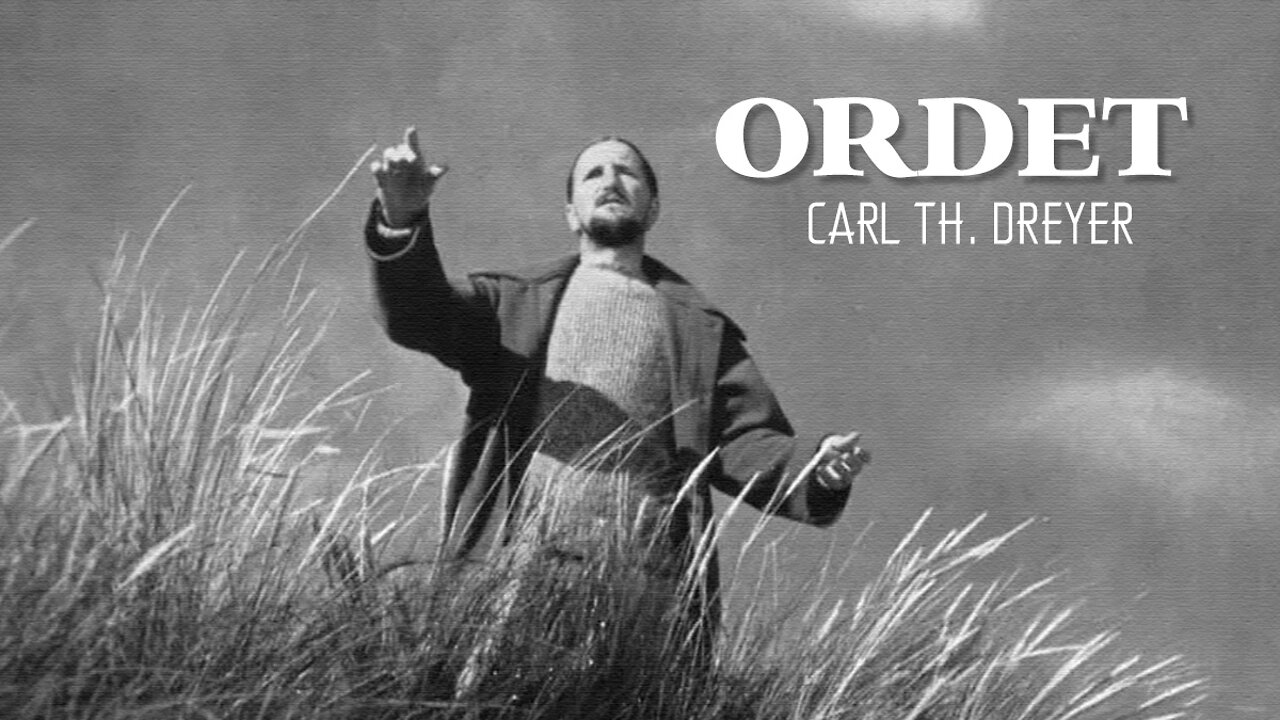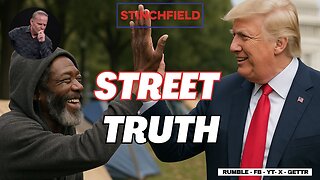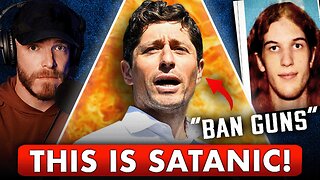Premium Only Content

Ordet (1955 Movie)
A farmer's family is torn apart by faith, sanctity, and love -- one child believes he's Jesus Christ, a second proclaims himself agnostic, and the third falls in love with a fundamentalist's daughter. Putting the lie to the term "organized religion," Ordet (The Word) is a challenge to simple facts and dogmatic orthodoxy. Layering multiple stories of faith and rebellion, Dreyer's adaptation of Kaj Munk's play quietly builds towards a shattering, miraculous climax.
Original Video:
https://archive.org/details/Ordet
.................
The Film That Changed My Life
By Kenneth Ring, Ph.D.
https://www.kenringblog.com/2022/06/the-film-that-changed-my-life.html
A few years ago when I was in touch with one of my elderly friends -- almost an exact contemporary as we were born nine days apart in 1935 -- he happened to mention that his son, Ben, was a fledgling film director who also was something of a film critic. This interested me since during those years I was in the midst of conducting a kind of film tutorial for my girlfriend, Lauren, to help fill a deplorable lacuna in her movie-going life. Like an insufferable Henry Higgins, in the role of a film maven, I considered it my task to educate my girlfriend about what she had missed during the course of her life.
Ben turned out to be a very savvy and astute film critic, and no mere "movie lover," as I was. He turned me on to a number of films I had never heard of. I learned a lot from reading his film commentaries and from his letters. Still, we often disagreed about films we had both seen. Mostly that didn't bother me. I enjoyed our sometimes feisty exchanges, but one of our quarrels really irked me since it dealt with the most important film I had ever seen, one that had changed my life.
On my recommendation, Ben had seen this film with his father. They both found fault with it and were not impressed. I couldn't believe that someone as knowledgeable about films as Ben clearly was did not appreciate this film in the way I did. Moreover, he didn't appear to understand what this film was really about, much less its significance.
I therefore took it upon myself, in my arrogant Henry Higgins manner, to educate Ben, so I sent him the following commentary, which I have slightly edited here, and which is also the story of how this film came into my life so serendipitously and how it came to have a life-altering impact on me.
...
In 1958, I had just arrived in Minneapolis to begin my life as a graduate student at the University of Minnesota. I was 22 years old, and this was the first time, other than when I was a kid when I had spent a couple of summers in Brooklyn with my family, I had ever been on my own. After a few weeks I had met a few students, but I was still finding my way about. One Saturday, I happened to be free, so I went to the movies to see a film I had never heard of.
Ordet.
I was at the time, if not an atheist, then certainly an unbeliever. In high school and then into my first year of college, I had a girlfriend who had been an ardent member of the Presbyterian Church and aspired to become the first female minister in that denomination. We argued passionately all the time about religion. Basically, I thought it was bunk. I couldn't understand how any thinking person could believe in God. I hadn't from a young age — no one in my family was religious and all of my mother's sibship was hostile to it. My intellectual hero at the time was Bertrand Russell.
I found Ordet to be mesmerizing, however. Each of the shots seemed to be like a tableau -- a beautiful painting. I remember the father climbing up the hill to look for the wayward Johannes, who, as you now know, plays a Christ figure in the film. The latter, clearly demented (later in the film there is a joke of sorts -- he had read too much Kierkegaard), a literal voice crying out in the wilderness. There are two other brothers and the wife, Inge, of the middle brother, who is the heart of the family, the heart of the film. All slow moving. I was deeply absorbed, almost from the beginning.
Of course, it is a film about faith -- or the lack of it. I don't need to summarize the story and the various plot lines since you have seen the film itself. [For that, I suggest you may want to consult Roger Ebert's excellent plot summary, which you can find on the Internet.] Each character is interesting, and outside the family, too -- the good, earnest minister, the cocksure, arrogant doctor, the man of science. And of course Johannes, the mad Christ. Yes, he whines — no one will listen to him. He is speaking Christ's truths but no one will hear him. He dresses in that shabby robe, and can never look anyone in the eye. You wonder where this film is going or at least I did. Spellbound by the mystery.
Inge gets pregnant. And Johannes again disappears, but this time they can't find him. The younger brother, Anders. has been rejected by the tailor's family in his suit for Anne's hand; he is not of the right religion. The screws are tightening.
Inge goes into labor. Problems arise. It's touch and go — there is anguish all around. The doctor eventually says Inge will survive. The doctor has a drink, very self-satisfied, with the family.
But as you know, Inge doesn't survive. Her husband, Mikkel, who has — like me — never been a believer like his wife, is in the most wrenching despair and grief. It was almost unbearable for me to watch him.
There is the service for Inge as she lies on the bier. The tailor's family comes and they are reconciled with Inge's family; the young brother will have his Anne. But Inge's husband will have no one! His anger and grief mount. The minister does his thing.
And then -- shatteringly -- Johannes appears. He is now wearing a sweater instead of his robe. His presence is powerful. He can now look people in the eye. He now speaks in a strong voice. Mysteriously, he has become transformed. His presence causes consternation all around. Inge's husband is beside himself.
The little girl, Inge and Mikkel's young daughter, who has always believed in Johannes (she is the only one with true faith) now comes into play. He asks her if she believes he can raise Inge from the dead. She nods. People want to stop this madness, but the new Johannes has become the dominant figure in the scene.
He gives his invocation over Inge's body. She does not move or stir. For the longest time — at the time it seemed like minutes to me, though I know now it was only some seconds — she remains still. And then, the barest fluttering her eyelids. A miracle is about to take place, as if it is right out of the Bible. Johannes (Christ) is going to raise someone from the dead.
The little girl smiles. The faith of a child….
Inge stirs into life. Her husband, completely overcome, rushes to embrace her. He now believes.
I was that husband.
I couldn't believe my response to that film. I was completely overcome. Heaving with emotion! What had happened to me?!
Afterward, I could only think that this was really the first true religious experience I ever had -- of the truth of religion and of God.
Yes, it was "just a movie," but not for me.
Roger Ebert, too, on first seeing this film, was similarly shaken, as he admitted in his own review of the film:
When the film was over, I had plans. I could not carry them out. I went to bed. Not to sleep. To feel. To puzzle about what had happened to me. I had started by viewing a film that initially bored me. It had found its way into my soul. Even after the first half hour, I had little idea what power awaited me, but now I could see how those opening minutes had to be as they were.
Many years later, when I was a professor at UCONN, I knew the people who ran the Friday night film series there. One day they asked me to suggest a film for the next season. Naturally, I recommended Ordet. It played to a pretty packed house. I had exactly the same reaction to it as I did the first time. Later, it turned out, about half the audience also had a similarly strong response to it. As for the rest, it just didn't affect them deeply or perhaps they didn't really get it, who knows?
I've seen it a couple of times in still later years, including showing it to my girlfriend a few years ago, who did "get it." I teared up at the end again! Each time. I guess that film was made for me, that's all I can say. That was the beginning of my knowing that my girlfriend in high school was right.
I did after all go over some elements in the plot in giving this account which I've never done before because I wanted you to try to see this film with my eyes, through the lens, as it were, of my psyche, as it was when I was 22 years old and had come into the theater with pretty much the same views as the doctor in the film. I left the theater a different person….
Now I would like, with your indulgence, to say just a few more words about Ordet in order to clear up what might not have been explicit in my own commentary. But it only really relates to the end of the film, which put you off. I'm hesitant even to suggest that someone as knowledgeable about films as you are might not have fully grasped Dreyer's intention here, but I think I can at least offer another perspective on that ending that perhaps you hadn't considered.
I don't really know that much about Dreyer -- just have read various bits about him over the years, but no biography and I typically don't read the literature on film, directors, etc. -- so I don't really know what his religious views were. But apparently he was not a religious man himself. I do know, however, that he made a couple of other films that dealt with religious intolerance, including one of the widely acknowledged greatest silent films of all time about Joan of Arc. Ordet, too, is about religious intolerance, though that's not the main theme of the film, which is, of course, faith. True faith, not merely the conventionally professed kind that the Borgen père represents.
So what do we have here from this perspective? We have a Christ figure who returns to earth in the form of a demented religious zealot. He is pathetic and insufferable. Your dad was put off by his whining. Of course, that's just the point. People encountering him feel sorry for him or embarrassed or impatient (except for Inge, the one who represents true faith in the film). No one wants to listen to his religious ravings — which are the teachings of Christ, right out of the Bible. No one has true faith.
So let's fast forward to the end of the film. Johannes has returned, but now he is intact. Yet people still do not believe that he represents the power of Christ in his being, which of course, drawing on the Bible, includes the power to raise the dead.
But the little girl believes, and that's enough.
Inge has to be raised from the dead at the end -- this is absolutely ordained by the logic of the story, which is a miracle story. Sorry to disagree with you, Ben, but this was in no way a "cheap shot." Nor was it unrealistic even if it confounds reason. Without that ending, there would have been no point to the film. Everything was building to that climax, which was why, for me, it was so overwhelming. Imagine seeing a miracle with one's own eyes! If you are drawn into the film -- forgetting that it is a film -- you are there, 2000 years ago, watching Christ raise Lazarus from the dead.
For me, that film represented the first crack in my up to then solid wall of religious skepticism, even hostility to religious sentiment. No more. It was also the first awakening in what was to become my spiritual development that ultimately led to my interest in near-death experiences. Inge, on her death bed, comes back from the dead. Need I say more about how that film was to prefigure my life? Would I ever have come to research NDEs if I hadn't seen that film when I was 22 years old?
...............
Roger Ebert’s Plot Summary
https://www.rogerebert.com/reviews/great-movie-ordet-1955
The End-of-Life Epiphany Of Roger Ebert
https://the-formula.org/the-end-of-life-epiphany-of-roger-ebert/
About Dr. Kenneth Ring
http://thepurposeoflife-nde.com/kenneth-ring/
Kenneth Ring’s Website
http://kenring.org
Kenneth Ring on Near-Death.com
https://near-death.com/kenneth-ring/
Kenneth Ring on Wikipedia
https://en.wikipedia.org/wiki/Kenneth_Ring
-
 5:25
5:25
Sunfellow On Jesus
1 year agoSheriff Mark Lamb Recounts Seeing The Face Of Christ
212 -
 LIVE
LIVE
The Mel K Show
1 hour agoMORNINGS WITH MEL K -This Labor Day Celebrate Liberty, Freedom & Family! 8-29-25
467 watching -
 LIVE
LIVE
The Shannon Joy Show
2 hours ago🔥🔥The Butchers At Hilo Benioff Hospital Hawaii - Mom Subjected To Forced C-Section & Abuse🔥🔥
279 watching -
 LIVE
LIVE
LFA TV
5 hours agoLFA TV ALL DAY STREAM - FRIDAY 8/29/25
4,244 watching -
 LIVE
LIVE
Grant Stinchfield
19 hours agoEven DC’s Homeless Beg for Trump’s Law & Order — While Wacky White Liberal Women Scream NO!
151 watching -
 1:02:30
1:02:30
VINCE
3 hours agoGavin Newsom Is A Major Trump Fan | Episode 114 - 08/29/25
141K109 -
 1:32:10
1:32:10
Nikko Ortiz
3 hours agoPainful Life Experiences
17.2K7 -
 1:42:16
1:42:16
Dear America
4 hours agoThe Left Chooses TRANS Over Christianity!! WOKE Mayor Is Doubling Down!!
88.1K54 -
 LIVE
LIVE
Caleb Hammer
2 hours agoGaslighting. Toxic. B*tch. | Financial Audit
94 watching -
 LIVE
LIVE
Viss
2 hours ago🔴LIVE - Positioning, Tactics, Strategy How To PUBG! - PUBG 101
103 watching